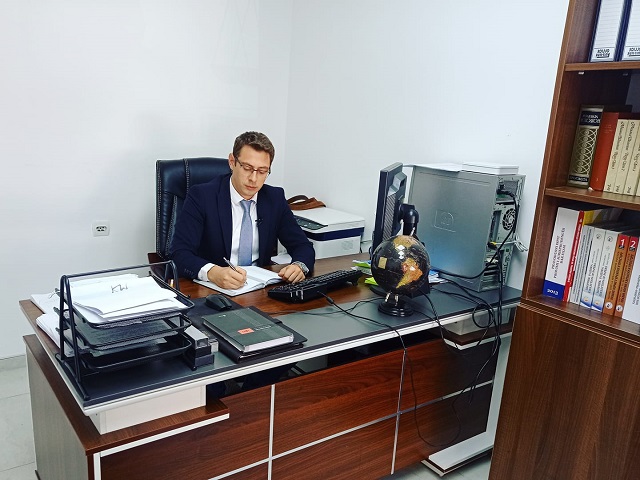It is 9:15 and the trial is scheduled for 9:00. Everyone who was summoned today is sitting in the corridor of the Basic Court. In front of courtroom number 4 is my client, who is the injured party, the defendant’s lawyer, a witness, a medical expert, and the state prosecutor. We’re waiting for the defendant, who did not come last time, so for today, the judge ordered that his presence be secured by an arrest warrant. Two policemen and the defendant appear around the corner of the hallway, they pass us, enter the courtroom, and they place him in the first row next to the wall. As a rule, one sits next to him, and the other behind the defendant. They take the handcuffs off his hands. The legal assistant goes by, also in a hurry. Carrying the case, she tells us: “Come in, the judge will be in soon.” We all enter. The prosecutor and I take our places, the defendant’s lawyer as well, and the others find their seats behind us. The judge enters, we all get up. She hurriedly says, “Sit down, sorry, we’re a little late.” She looks at her monitor, the court reporter whispers something to her, and the judge is resentful. I opened my notebook, the case, and I review the questions I had prepared today for the expert witness. The defendant’s lawyer does so as well. I think about how difficult it will be today to examine a medical expert, since medical terminology is complicated, and even with translation. “Uh… ” The judge announces the case, states those present, and then the main thing: “the court finds that there are no conditions for today’s hearing to take place because today’s hearing cannot be attended by the court interpreter, V.B., and the hearing is scheduled for the date ….” Off the record, the judge explains: “You know, we only have one interpreter in court, but he is ill today. Half an hour ago, he let us know that he would not be able to come, we tried to find a replacement from another branch, but that is not possible…”
I walk out of the courthouse and wonder how much did this cost the state today? Clearly, salaries are on a monthly basis and all this is within the “terms of service”, but to conduct such a hearing, we need the presence of a judge, a court reporter, a state prosecutor, two lawyers (in this case), a witness, an expert, a defendant, and two police officers. 10 people! Truth be told, it’s not the translator’s fault. He can’t choose when to get sick, nor does he want to, but that’s what happened. And how many times does this situation happen on an annual basis? In all courts in Kosovo and all branches and special departments or other institutions – police, municipality, inspection, tax administration…? Whose fault is it? How is it that the courts have only a few translators, and the branches of the courts have one?
You see, it’s not something that became necessary yesterday, so we didn’t manage today, or it’s something temporary, so we improvise until we overcome the obstacle. Albanians, Serbs, Bosniaks, Roma … we all have been living in Kosovo for a very long time and we know our language barriers. However, for the last twenty years, simply no one cared enough to deal with this issue.
I do not want to complicate this text with legal terminology, expressions, legal institutions, etc. I would instead like to present to you some of the problems from my point of view, but I will inevitably mention the “famous” problems with the translations of laws in Kosovo.
Everyone knows that there is the Law on the Use of Languages from 2006 and that it is part of positive legislation. This law prescribes which are the official languages, as well as who, how, and when should adhere to the use of official languages. It is very clear. However, what about the legislature itself? Does the legislature abide by “its own” laws? The Law on Civil Procedure (No.03 / L-006) which has been applied since 2008, will serve as a good example. Whoever had the opportunity to read part of the provisions of this law has a clear picture of what I am talking about. One cannot go beyond the first page of this law without already finding at least 5 or 6 mistakes in the first three articles. As an example, I will cite Article 2, paragraphs 1 and 2.
“In civil proceedings, the court decides within the limits of the requests made by the parties. The court implements the substantive law based on its assessment and is not related to the statements of the parties relating to substantive law. ”
If we go further, Article 3 §3 states “… the court shall not adopt the disposition of the opposing parties …”
One does not have to be a lawyer to notice this, but what is even more frightening are the catastrophic translations of legal institutions and the differences between the laws in the Albanian and Serbian versions. As a result, we get the same law with different provisions depending on the language you use. The most serious question is how is it possible that this law has been in force since 2008 (for 12 years and 3 months, up until today) without the legislature considering to correct this? The law must be equal to all in any language. Full stop. It seems extremely frivolous, as if someone said “here’s a bunch of these laws written in something that resembles your language, interpret at will …” When a problem arises, “we’ll see when the time comes and for everything you can’t translate, there’s Google Translate…” Please note, this is just one of the laws in practice and I have had the opportunity to see and read at least twenty more laws with catastrophic translations and errors, not to mention the number of administrative instructions, decrees, and regulations that have not been translated into Serbian at all. Does the legislature itself discriminate against citizens who use the Serbian language and script or does no one simply have enough time or will to regulate this extremely serious issue?
In lieu of a conclusion
We may not have an interpreter. Fine. It may happen that the laws have not been translated for us. No problem. Some have been translated, but they are extremely scarce. Well, don’t sweat it. What are we going to do? Nothing. Next year, Europe is getting closer to us, standards are rising, salaries are jumping, minorities have their percentages in the assembly and wherever it is needed. I ask what do we do with the language? Oh that, we will make a new one – better, just take it easy…
The author is a lawyer from North Mitrovica






























